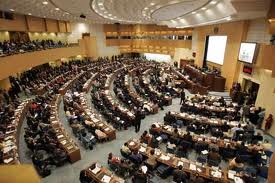Andrew graduated in the highest honors, coming tops in his graduating class among several other academic exemplary awards. The future looked bright for the young, fresh Engineering graduate. In line with the University tradition of retaining its brightest students for a potentially flourishing academic career, Andrew was offered a job as a Research Assistant with the University.
However, to the shock of everyone in the academic community, the enviable fresh Engineering graduate turned down the offer (in the midst of mass unemployment in the nation), opting instead to take on a political office job with the Local Government Authority as a Special Adviser to the incumbent Chairman (Mayor) of his local government area.
Andrew’s case is one of the many hundreds of thousands of bright undergraduates who readily derail from their academic glory, into the world of politics, even if the current tenure will only last a couple years. This ironically, is one of the many fairy tales of an economy whose elites are comprised of political office holders and their cronies alike.
In the case of Andrew, he is set on a career that will profit him in a month, a replica of his annual financial return as a Research Assistant in an academic institution both in salaries, allowances and other financially rewarding peripherals of office.
The expansive budget that goes into salaries and allowances of political office holders in the Nigerian economy is arguably considered to be the highest in the world. This is an economy which boasts the unofficial record as being the most expensive democracy in the world. In the words of a popular news blog, the Nigerian Senator in the House of Assembly earns an estimated $1.7million, four times more than the annual salary of the American president which stands at $400,000 per annum, while the average Nigerian federal minister takes home much more than his developed states counterparts in the likes of the US, Britain or Germany.
While the academic community mourns Andrew’s decision, his friends and family hailed his choice as the wisest he could have made.
James Phillips was a small business entrepreneur with a modest annual turnover. His business of packaging and distributing sterilized water in nylon sachets (popularly referred to as Pure Water) was the entire fulfillment he desired in providing for his family, taking financial responsibility for his children’s schooling and engaging in charity efforts in his local community.
While he relishes competition from other private competitors, a challenge he considers as an inspiration to work harder and more efficiently, unknown to him was the unexpected nightmare that beckons around the corner. The government through one of its public agencies decided to engage the local economy in the same packaging and distribution of the ‘pure water’. At first, it seemed another innocent competition until the regulatory decrees become aimed at crippling the competing small ‘pure water’ business in favor of the governments’ product.
In the end, James was not only made to drastically pay huge amounts in increased distribution rights taxes, but also has to endure obligated bureaucratic gridlocks, rising level of insecurity and unchecked worsening infrastructure in his local community.
To this end, it was only a matter of time before his once bright hopes of business expansion and increase in production for profit motives were cut short. As a former employer of labor, he resumed the role of a job seeker.
While the political style of regulation by unjust competition through Government’s profit-seeking intervention in the economy was bad enough, the worse news was he has to face a competition whose capital base is being replenished by his ‘forced contributions’ through taxes, a limitless and unaccountable financial chest as well as the insecurity of his life and properties through rising crime rate.
This brings the question of what manner of government derives pleasure in brain-draining and imposing poverty against the well-being of its citizenry? The answer is not far-fetched, it is the BIG GOVERNMENT…
Fiyinfoluwa Elegbede is a columnist on the AfricanLiberty VOICE OF LIBERTY Project



